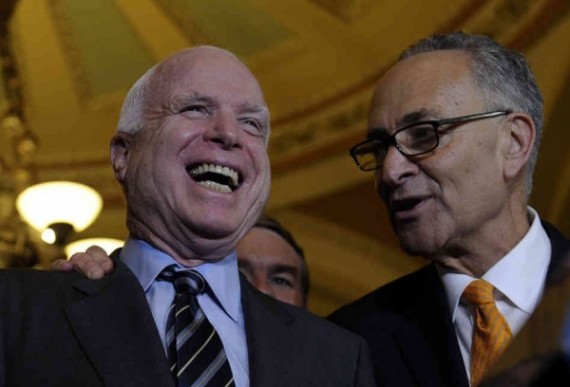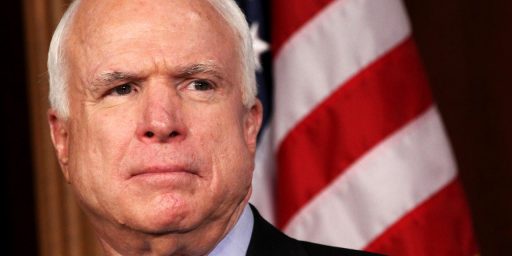John McCain: Obama’s Secret Weapon?
The president's 2008 rival has gone from bitter foe to go-to deal broker.
John McCain has long been a bitter foe of President Obama, who beat him in the 2008 contest for the White House. On foreign policy, in particular, the acrimony remains. Suddenly, though, the cranky 76-year-old senior senator from Arizona has become the key facilitator for getting things done.
Reuters‘ Thomas Ferraro (“McCain’s Deals And ‘Wacko-Bird’ Barbs Are Priceless For Obama“) explains:
To the far-right in the Republican Party, there is no mistake about it. In a party that generally brooks no compromise with Obama, McCain is the compromiser-in-chief. He’s negotiating with the White House.
And he’s in-their-face about it, having recently described as “wacko birds” two of the right’s most uncompromising heroes, Senators Ted Cruz and Rand Paul.
A recent article in the conservative National Review described McCain as “Obama’s secret weapon” and a “lethal threat” to a Republican victory in the budget battles this fall.
If Obama somehow wins an upcoming fiscal showdown with Republicans, the president may have McCain to thank.
The 2008 Republican presidential nominee, the man Obama beat, is now engaged in talks with a half-dozen fellow Senate Republicans and the White House aimed at trying to craft a bargain on critical fiscal issues to avoid a nasty standoff in the fall that could lead to a government shutdown or a government default, or both.
Obama already owes McCain for brokering the deal last month that allowed the president to overcome Republican objections and fill seven top administration jobs.
And McCain joined four Democrats and three Republicans in drafting the Senate’s landmark bill to overhaul U.S. immigration laws, a top Obama priority.
So popular has the Arizona Republican become among Democrats that Senate Majority Leader Harry Reid – who in 2008 said, “I can’t stand John McCain” – now describes him as a “great senator,” right up there with the late Ted Kennedy, the Democratic “lion of the Senate” who became a bridge between parties after his own presidential ambitions were crushed.
“He’s become our go-to guy,” a senior Democratic aide said of the 76-year-old white-haired senator.
So, what happened? Apparently, it’s mostly just relationships.
McCain said in an interview that he has been able to work more with Obama in part because the president has moved toward the middle in his second term and become more willing to negotiate.
McCain has also moved toward the middle after having veered toward the right in 2010 when he survived a Republican primary challenge and won election back home in Arizona to a fifth, six-year Senate term.
Two unrelated events have helped as well: McCain’s new friendship with Charles Schumer, the third-ranking Senate Democrat who worked with McCain on the immigration bill, and Obama’s choice of a McCain friend, Denis McDonough, as White House chief of staff.
The three have clicked.
At a time when the top congressional Republicans, Senate Minority Leader Mitch McConnell and House of Representatives Speaker John Boehner, rarely communicate with the White House, McCain does.
He said he and McDonough talked three times a day during the negotiations over Obama’s stalled nominations.
“With all due respect to his predecessors, Denis knows how the Senate works,” McCain said of McDonough, whom he knows from McDonough’s days as a senior aide to former Democratic Senator Tom Daschle.
“I will continue to pound him (Obama) on Syria. I will continue to pound him on Benghazi,” McCain said. “I will continue to pound him on a number of things, particularly on national security.
“But at the same time, I can find common ground with the president on certain issues,” McCain said.
“The president won’t owe me anything, but he may have a sense of satisfaction from being able to achieve some of the things that we ostensibly came here to do,” McCain said.
At the same time he is helping Obama, McCain may be helping himself.
He likes attention as much as any other politician in Washington – and more than many – and there’s no better way to get it than to talk about wacko birds.
In a city that rarely makes a deal, his recent feats of deal making have put him at the center of the action in Washington, enhancing his value as one of television’s favorite political guests.
My assessment of McCain has long been mixed. I reluctantly supported him very early in the 2008 Republican primaries, calling him “my least unfavorite” of the available candidates. While harshly critical of his selection of Sarah Palin as his running mate and his odd grandstanding over the financial crisis, I nonetheless supported him over the neophyte Obama.
Alas, whether because of bitterness over having lost to a man who had been alive less time than McCain had been in public service, the pressures of having to face a tough fight just to hang on to the Senate seat after that, or genuine frustration over foreign policy visions, McCain has emerged as a Grade A crank since the loss. He’s been a sore loser and occasionally, such as in the Chuck Hagel confirmation hearings, been a genuine embarrassment.
He’s served too long and honorably for that to be his legacy. Brokering some sensible compromises and helping save his party from the wacko birds would go some way to restoring his reputation. (Of course, choosing one of them as his running mate did a lot to tarnish it.)
On Syria—and on military interventionism, period—McCain and I simply disagree. But many foreign policy experts whom I respect greatly, including many of my Atlantic Council colleagues, are on McCain’s side in that fight. But McCain’s instincts on immigration, judicial confirmations, and Senate procedures have been right for years. So, it’s good to see him take the lead there and get things moving in the right direction.







There was certainly a time when I respected John McCain. That time is passed, but credit where credit is due – he sees that government needs to do *something*, unlike many of his colleagues.
Daniel Larison has a good reaction to this post.
McCain’s Grudge-Driven Politics
@Ron Beasley: Yes, Dan makes a good point.
@Ron Beasley: I see from the link to Dr Larison that we share more than our distinquished hairlines, Mr B.
Looked into the Nat’lReview article (“Can Anyone Stop John McCain”) and noted that the author’s main concern was, as pointed out by Dr Joyner and the Reuters article, that there are a group of Republican Senators who will work with Senate Dem’s to pass the President’s ‘Jobs Stimulus’ and deficit ceiling bills in the Upper House with greater-than-60 votes which will leave the House of Representatives looking obstructionist when they refuse to allow their members to vote because of the ‘Hastert Rule’. As is usual in these kinds of articles, Sen Lindsey Graham comes in for lots of abuse. Several Repub Congressmen get quoted grumbling that the Senate ain’t gonna tell them what to do, ‘they’re not the boss of me!, and yadda yadda.
What’s interesting is the immense strains that are being applied to the Republican Party. Not a new thought, I know. But worth pausing to consider. If they have a bad outcome (from their point of view) in ’14, it might well crack. My prediction, anyhow.
I tend to agree with the Larison anaylsis that McCain’s wild swings of the past decade and a half are more based upon private grudges than principled feelings. And so I find it amusing that a party which invests so much rhetoric on the character of leaders being so critical could have nominated him for the Presidency in the first place, much less view him as a significant and well-rspected leader after all of his shifts.